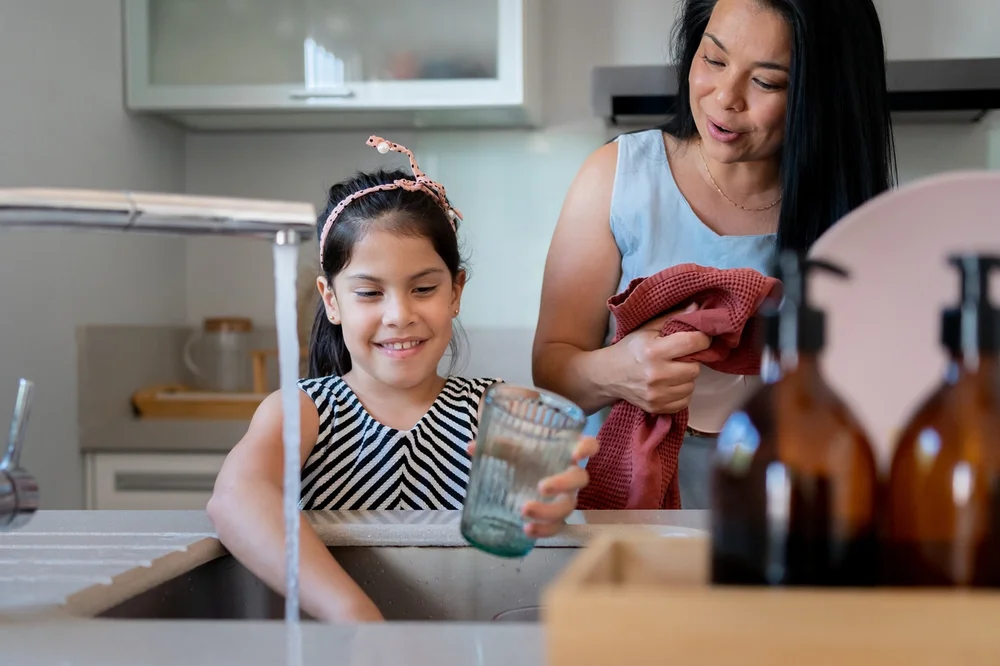Expert Tips on How to Raise Confident Kids in the Modern World
How do you build confidence in kids and why is it important? When raising our children in this modern world, self-confidence is the key to unlocking potential.
In other words, no matter individual opportunities or resources, a person’s ability to achieve their potential is largely based on their level of belief in themselves.
The good news is that confidence isn’t a fixed attribute. We can help our kids develop confidence. Confidence is learned and shaped by the thoughts you think and the actions you take. It isn’t so much based on your actual ability, as it is on your belief in your ability.
If you think about the nature of kids, they are born with an incredible desire to “try” which can blossom into confidence. Most two-year-olds are proficient in the phrase, “I can do it myself,” not because they actually have the ability to do the given task themselves, but because they believe they do.
Children look to us for validation and guidance.
The way that adults involve and respond to children as they try new things will contribute to their self-confidence. For example, when young children want to help in the kitchen, do we give them a simple task like stirring or washing, or do we push them aside to avoid the potential mess? When they’re throwing the laundry, do we scold them and shoo them away, or do we show them how to sort it and put it in the basket?
There are many ways to build confidence in kids. It’s important for them to trust in themselves so that they will continue to try new things, while also learning that things will be okay if they aren’t successful at something at first. Confidence goes hand in hand with resilience, another essential quality for growth.
Parenting expert Michaeleen Doucleff shares in her book, Hunt, Gather, Parent: What Ancient Cultures Can Teach Us About the Lost Art of Raising Happy, Helpful Humans, knowledge that she learned from her research with Maya, Inuit, and Hadzabe families. The tips that she gives us to help raise helpful and confident children are age-old in these cultures, but not as intuitive in western society.
3 Tip on How to Raise Confident Kids

1. Let Kids Contribute
Don’t send kids away when they show an interest in helping with chores. “Toddlers will come over and want to help with the laundry or dinner, and American parents will often tell them, ‘No, go play.’” Doucleff says.
If we don’t let our children help, over time they’ll learn that their role in the home isn’t to contribute to the family dynamic, but to play independently. Usually, by the age of 6 or 7, the desire to help in the home disappears in America.
The best thing you can do is include them in whatever chores you’re doing, especially if they show an interest. Find age-appropriate tasks for even the youngest helpers. Let kids really contribute. Seeing that they’re valued and needed will go a long way in building their confidence.
Doucleff says, “Just tiny little things, like stir the pot, chop the herbs, go get the vacuum… This motivates children because they see they are making a contribution. And that is way more motivating than praise.”
2. Include Them in Your World
It’s normal for parents today to fill their children’s schedules with a variety of kid activities, essentially creating a separate kid-world for them. This separation actually can create more stress and less connection between parents and kids.
Doucleff describes a conversation she had with another mother in her book, “Many moms will say something like ‘Come, my child. Help me while I wash the dishes…’ The invitation is always for doing the chore together.”
It doesn’t always have to be doing a chore together. It can be as simple as including your kids in conversation with you while you go about your day. At the end of the day, the focus should be on togetherness and the relationship with your child.
Instead of scheduled kid activities, try this:
- Involve kids in household tasks
- Cook together
- Do hobbies together
- Let them play with other kids
Try scheduling less for your kids and include them in your world more. It just might reduce stress for your children and for yourself.
Doucleff explains the cooperative team dynamic that happens when you do this, “They will want to help clean up after dinner or make the beds in the morning, because if they’re a part of your world and with you all the time when you’re doing these things, they see that as their role in the family to help.”
3. Give Less Commands
How often do you give commands to your child in a day? In an hour? It’s probably more than you think. Even simple things like, “Don’t touch that. Get down.”
Doucleff challenges us to experiment by recording ourselves parenting and see how many commands or instructions we give per hour. Try to limit it to 1-3 times per hour.
Instead of giving commands, do this: Ask questions or explain consequences.
This approach assumes you trust that your kids are smart enough to figure it out. It builds confidence.
Giving less commands will give autonomy to your kids. Autonomy is the feeling that you have the ability to make your own choices, but it also involves recognizing that you’re connected to other people.
Who doesn’t want to feel like they’re in control of their choices and their life? Everyone does, even kids. They already have such little control over their schedules.
Practice backing off and allowing kids to decide what to do. This doesn’t mean not watching, it just means not stepping in when you don’t need to.
Why giving more autonomy to kids is important:
- Builds confidence
- Improves self-motivation
- Reduces stress
- Reduces feelings of anxiousness
- Increases independence
- Improves problem-solving skills
The Takeaway
Raising confident kids in the modern world doesn’t need to be complex.
Let kids contribute to your household even if they make a little more mess when they’re younger. It will pay off as they grow and feel like part of the family team. Include them in your world by simplifying theirs. Finally, allow your children to have more autonomy by giving less commands.
Your relationship will be a buffer for the stress they’ll inevitably encounter in our modern world. If kids know they have someone to count on when things are hard or when they fail, they’ll be able to move through life with more confidence.
At BrainMD, we’re dedicated to providing the highest purity nutrients to improve your physical health and overall well-being. For more information about our full list of brain healthy supplements, please visit us at BrainMD.



